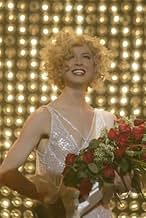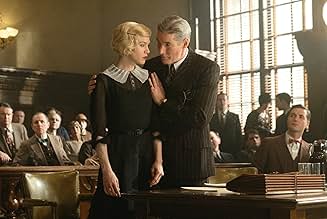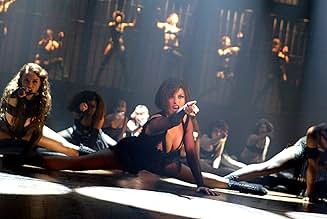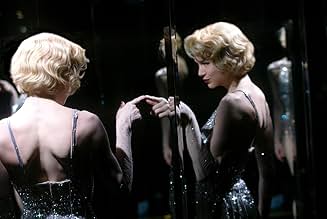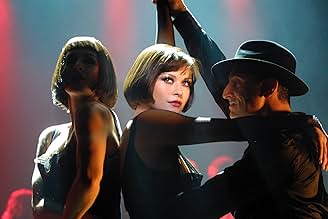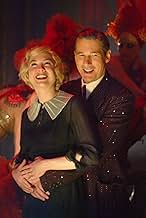Zwei Mörderinnen aus der Todeszelle entwickeln eine heftige Rivalität, während sie um Werbung, Prominenz und die Aufmerksamkeit eines schmierigen Anwalts kämpfen.Zwei Mörderinnen aus der Todeszelle entwickeln eine heftige Rivalität, während sie um Werbung, Prominenz und die Aufmerksamkeit eines schmierigen Anwalts kämpfen.Zwei Mörderinnen aus der Todeszelle entwickeln eine heftige Rivalität, während sie um Werbung, Prominenz und die Aufmerksamkeit eines schmierigen Anwalts kämpfen.
- 6 Oscars gewonnen
- 59 Gewinne & 129 Nominierungen insgesamt
Empfohlene Bewertungen
It's one of the best cinematic musicals, with a superb translation from stage to screen that immediately gets you looking for theatrical performance tickets once the titles roll. The performances are sublime, the songs and lyrics superb, and the joy you walk away with overwhelming.
The cinematography, sound, art directions, and especially the costume design they were all expertly done. I resisting the urge to dance and tap my shoe. What an amazing production it took to create this film. Everyone deserved their Oscar Wins or nominations whomever took part in the production. 1920s Chicago comes alive in breathtaking detail. Everyone whom likes musicals or music should definitely have a listen and watch Chicago.
Rob Marshell truly out did himself in this masterpiece. 10/10
My favorite production is "The Jailhouse Tango." It made me reach way back to Elvis's "Jailhouse Rock." However, the stage of this era is much more well equipped to do such a gigantic show-stopping, lengthy, hysterically funny & ever so well danced & sung routine. I can watch that 1 number time & again & find something new I love about it. I also have to agree with the other commentators who couldn't find a single 'bad' number in the entire show.
Yes, Richard Gere can certainly dance & sing in a musical. I found the editing of the trial & Gere's tap dance utterly fascinating. You know, when a dancer is being filmed doing a routine we never know who or what will be in the final cuts. For instance, in "Staying Alive." I knew those dance routines & a few of the dancers. They were truly peeved at the nasty chop job that was done to great dance routines. Not so in "Chicago." Credit has to go also to terrific camera work which did the best job I've ever seen to avoid losing any parts of the stage or the all of dancers' movements.
Most outstanding is "Mr. Cellophane." Shirley Maclaine once did a TV version of "One" using her gorgeous figure & a simple hat, plus a series of ever so subtle dance moves that expressed pure classiness of pure Shirley the marvelous dancer. Reilly uses his costume & hat with those very few subtle moves to express the whole character he plays. It's easy to write he is quite emotionally moving & sings very well.
The contrast between the big production number of The Jailhouse Tango & Mr. Cellophane couldn't be greater. Tango is way high energy, lots of lovely female dancers & singers, with the exception of a very few males: Mr. Cellophane is nearly done in one man's singular slow motion. The choreography had to have been the dancers' delight! Yum.
Zellwenger & Zeta Jones make for a very similar contrast in both their dancing & singing styles. I was nearly shocked that Zeta-Jones could belt out a song Ethel Merman style! At times she brought Merman back to life. Zellwenger belongs in musicals she's so sizzling hot in dance costumes that accentuate a dancer's body & she can really sing while she's performing the piece quite exotically. I can see why prudish folks detest the show. It's sensuous with lots of sexy body work going on. Puritanicals Beware! Nevertheless, the way The Jailhouse Tango started off quite cleverly with such a simple sound as the drip, drip of a jail cell faucet to pace the rhythmic beat at the beginning of the production number was unique & brilliant. So that's one reason why I write that number is the one that stands out most to me. But just as I write that I recall the big number of the live human 'puppets'. How clever was that. Zellwenger & Gere pulled that one off masterfully together with much of the cast as their backup chorus.
I can't possibly understand anyone who writes that it was a flop or they didn't like it. But I do respect your opinions. 10 of 10, undoubtedly. (Chicago makes "Moulin Rouge" look like gooey overly-romantic, made for teenagers, face sucking >blek<. I'm too old to appreciate that nonsense. Give me the all out flaming musical for adults ::winking::).
PS--If you love song & dance musicals, or want to, see "Cats." (Or perhaps fast forward to Grizabella's scene singing & acting out Andrew Lloyd Webber's classic rendition of "Memories"). Musicals can take us away from the heaviness of today to another realm to view the insides of another character through their movements & songs. Thank you for reading me~
To tell the truth, I've never been much of a fan of the stage show. Bob Fosse (with help from John Kander and Fred Ebb) designed the show as a series of vaudeville skits tied together by the flimsiest of books. If you like revues with great choreography, the show worked fine; if you were looking for an actual "musical", you were better advised to look elsewhere. Prior to this film, I'd have thought that you'd also have to look elsewhere to find good material for a film.
Then came Rob Marshall. Conceiving the show as events as seen through Roxie Hart's (Renee Zellweger) imagination, the dance numbers become believable because she truly sees all the world as a stage. In effect, what Marshall has done is substitute Roxie for the theater's live audience and, in the process, made the theatrical touches plausible within the film's context. In doing so, Marshall has relied upon superb editing and choreography to keep up the pace and continuity (such as it is) of the film.
Perhaps the best example of this is "Cell Block Tango," which on stage is a stylized number that is removed from the central action of what book there is. In the film, the number arises from various conversations Roxie has had with other prisoners, focused through her show-biz crazy mind, and puts her own acts in context. Likewise, "They Both Reached for the Gun," played as a ventiloquist act in which her mouthpiece Billy Flynn (Richard Gere) pulls both Roxie's strings and those of the press, and uses Roxie's mind as the filter to point up the ease in which the public can be manipulated.
In choreographing these numbers, Marshall has also done an impressive job. Rather than merely revive Fosse's choreography from the 1975 production, he seems inspired by it to create new choreography that plays off the editing for maximum effect. The two aforementioned numbers are excellent examples of this choreographic technique, as well as "All That Jazz" (intercutting between a vaudeville dance act and two plot threads), "Mr. Cellophane" (beautifully performed by John C. Reilly, as Roxie's schlepp of a husband), "I Can't Do It Alone" and "Razzle Dazzle." Marshall also allows a dose of sanity to slip into the proceedings with a non-musical number, in which a seemingly wrongfully convicted woman is put to death -- the scene slams the brakes for a moment, lest we be completely seduced by the glitter or Roxie's perspective, and lose our own rational perspective on right, wrong and justice. It's a jarring moment, but a responsible (and some may say necessary) one.
The performances are, for the most part, up to the task. Catherine Zeta-Jones richly earned her Oscar as Velma Kelly -- vocally, choreographically, and in the acting department. Gere is also very good (his tap dance number is truly impressive), and John C. Reilly (as Roxie's schlepp husband) and Queen Latifah (as an opportunistic warden) are outstanding. In fact, the weakest performance in the film is Zellweger, and this seems more of a fault of the script than Zellweger. Even though most of the film focuses on her, she remains a cipher at the end of the picture, most likely because the central conceit of the film (Roxie's perception of events) gets in the way of her character development. She still does the best job she can with what she's given with an underwritten part (to be fair, the part is even less well written for the stage version).
Did "Chicago" deserve to beat "Gangs of New York" or "The Pianist" for Best Picture? I'm not sure. All I know is that the film is an incredible achievement given its source material and the natural disadvantages of converting musicals to film. Marshall set out to climb K-2, and he reached the top.
Oscars Best Picture Winners, Ranked
Oscars Best Picture Winners, Ranked
Wusstest du schon
- WissenswertesIn the beginning of the scene introducing Matron Mama Morton (Queen Latifah) to the new inmates, Roxie Hart (Renée Zellweger) has a brief conversation with a woman smoking a cigarette. That character is played by long-time Broadway actress Chita Rivera, who portrayed Velma Kelly in the original 1975 production of "Chicago."
- PatzerThere are 50 stars on the US flag in the courtroom (should be 48).
- Zitate
June: I'm standin' in the kitchen, carving up a chicken for dinner, minding my own business, when in storms my husband, Wilbur, in a jealous rage. "You've been screwing the milkman," he said. He was crazy, and he kept on screaming, "You've been screwing the milkman." And then he ran into my knife... he ran into my knife ten times.
- Crazy CreditsNear the end of the credits, just so there are no doubts: Catherine Zeta-Jones' singing and dancing performed by Catherine Zeta-Jones Renée Zellweger's singing and dancing performed by Renée Zellweger Richard Gere's singing and dancing performed by Richard Gere
- Alternative VersionenThe musical number "Class," featuring Queen Latifah and Catherine Zeta-Jones, was deleted from the final version of the film. However, it was recut into the movie for a brief, extremely limited theatrical re-release in the summer of 2003. It then appeared on DVD as a bonus feature, but was NOT intercut there.
- SoundtracksOverture/And All That Jazz
Music by John Kander
Lyrics by Fred Ebb
Performed by Catherine Zeta-Jones, Renée Zellweger, and Taye Diggs
Published by Unichappell Music, Inc. (BMI)
Top-Auswahl
Details
- Erscheinungsdatum
- Herkunftsländer
- Offizielle Standorte
- Sprachen
- Auch bekannt als
- Chicago: The Musical
- Drehorte
- Ontario Legislature Building, Queen's Park, Toronto, Ontario, Kanada(as courthouse steps for press conference)
- Produktionsfirmen
- Weitere beteiligte Unternehmen bei IMDbPro anzeigen
Box Office
- Budget
- 45.000.000 $ (geschätzt)
- Bruttoertrag in den USA und Kanada
- 170.687.518 $
- Eröffnungswochenende in den USA und in Kanada
- 2.074.929 $
- 29. Dez. 2002
- Weltweiter Bruttoertrag
- 306.777.366 $
- Laufzeit1 Stunde 53 Minuten
- Farbe
- Sound-Mix
- Seitenverhältnis
- 1.85 : 1
Zu dieser Seite beitragen








